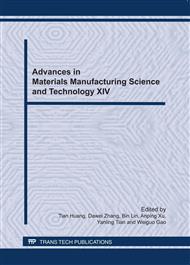p.525
p.529
p.533
p.537
p.541
p.546
p.550
p.554
p.560
A Critical Chain Project Scheduling Problem with Multi-Mode
Abstract:
Critical chain method (CCM) is a new project method which combines project network technologies and management arts. Although there are lots of researches on it, the existing critical chain method has some drawbacks limiting its decision level in practical application. To improve the decision level and application range of critical chain method, the critical chain method with multi-mode is studied. The project network technology is the foundation of project scheduling problem. All the existing project management tools can only support single mode project network, that is, all the project activities have only one executive mode. We study the multi-mode project network as the foundation of multi-mode CC. Furthermore, by relating multi-mode project network to critical chain method, the critical chain method with multi-mode is presented, and the implementation procedure is proposed. In the implementation of multi-mode CCM, the activity priority rules and mode priority rules are investigated.
Info:
Periodical:
Pages:
541-545
Citation:
Online since:
September 2011
Authors:
Price:
Сopyright:
© 2012 Trans Tech Publications Ltd. All Rights Reserved
Share:
Citation:


